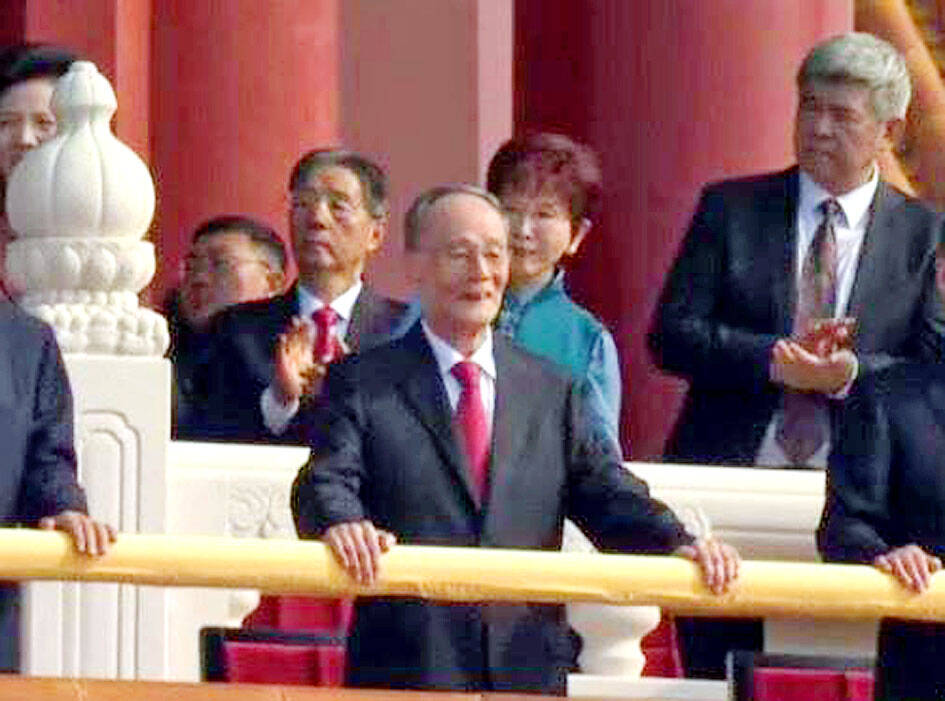The Democratic Progressive Party yesterday slammed former Chinese Nationalist Party (KMT) chairwoman Hung Hsiu-chu (洪秀柱) for attending China’s military parade commemorating the 80th anniversary of the end of World War II, saying that she supported authoritarianism.
In China Central Television’s live broadcast, Hung could be seen standing near former Chinese vice president Wang Qishan (王岐山).
Hung’s attendance at the event featuring authoritarian leaders brought “shame” to her and the KMT, the DPP wrote on Facebook.

Photo: screen grab from the China Central Television Web site
Chinese President Xi Jinping (習近平) was flanked by Russian President Vladmir Putin and North Korean leader Kim Jong-un as they watched the parade, it said, adding that the leaders of Belarus and Myanmar were also in attendance.
“Hung not only failed to distance herself from the event, but ran toward it absurdly to stand beside dictators in acceptance of China’s ‘united front’ work,” it said.
Hung’s behavior contradicts herself, as she in 2015 criticized a Chinese military parade for claiming that Chinese communists had done most of the fighting during the Second Sino-Japanese War, the DPP said.
New Power Party Chairwoman Claire Wang (王婉諭) said that the Chinese military parade was a “dictators’ party” serving as the launch of an “axis of evil alliance.”
Beijing utilized the parade to remove the KMT from the historical narrative, legitimize its plans to annex Taiwan and put up a show of force against democracies around the world, she said.
Taiwanese should reject China’s false narrative, which is a pretext for potential aggression, Wang said.
Reaction within the KMT was mixed, with senior party figures either defending or avoiding the issue.
KMT Chairman Eric Chu (朱立倫) said that former president Chiang Kai-shek’s (蔣介石) Nationalist forces did most of the fighting during the war.
Chinese communists made contributions, but they should not obscure the fact that the KMT was the main force fighting Japan, he said.
President William Lai’s (賴清德) address, which referred to yesterday as the anniversary of the end of World War II instead of a “victory day,” had “brought shame to the nation,” Chu said, adding that Lai was “aping Japanese.”
Separately, former KMT Taipei mayor Hau Lung-bin (郝龍斌) wrote on Facebook that his late father, Hau Pei-tsun (郝柏村), a former premier and chief of the general staff, had repeatedly turned down Beijing’s invitations to its parades.
Hau Pei-tsun viewed the Chinese Communist Party’s claim of being the main contributor to victory in the war in China as a usurpation of the KMT forces’ achievement, he said.
“History’s lesson to us is to stay on the one true path of insisting on peace,” Hau Lung-bin wrote.
Former KMT legislator Cheng Li-wun (鄭麗文) said the DPP had smeared Hung’s motives, and sowed division and hate across the Taiwan Strait when the two sides wanted nothing more than peace.
Hung understood that Beijing’s military parade was a gesture of China’s “commitment to peace, not an intent to trigger an arms race or provoke war in the region,” Cheng said.
The former KMT chairwoman “does not want to turn Taiwan into a second Ukraine,” she said.
Additional reporting by Huang Cheng-chia

The manufacture of the remaining 28 M1A2T Abrams tanks Taiwan purchased from the US has recently been completed, and they are expected to be delivered within the next one to two months, a source said yesterday. The Ministry of National Defense is arranging cargo ships to transport the tanks to Taiwan as soon as possible, said the source, who is familiar with the matter. The estimated arrival time ranges from late this month to early next month, the source said. The 28 Abrams tanks make up the third and final batch of a total of 108 tanks, valued at about NT$40.5 billion

Two Taiwanese prosecutors were questioned by Chinese security personnel at their hotel during a trip to China’s Henan Province this month, the Mainland Affairs Council (MAC) said yesterday. The officers had personal information on the prosecutors, including “when they were assigned to their posts, their work locations and job titles,” MAC Deputy Minister and spokesman Liang Wen-chieh (梁文傑) said. On top of asking about their agencies and positions, the officers also questioned the prosecutors about the Cross-Strait Joint Crime-Fighting and Judicial Mutual Assistance Agreement, a pact that serves as the framework for Taiwan-China cooperation on combating crime and providing judicial assistance, Liang

A group from the Taiwanese Designers in Australia association yesterday represented Taiwan at the Midsumma Pride March in Melbourne. The march, held in the St. Kilda suburb, is the city’s largest LGBTQIA+ parade and the flagship event of the annual Midsumma Festival. It attracted more than 45,000 spectators who supported the 400 groups and 10,000 marchers that participated this year, the association said. Taiwanese Designers said they organized a team to march for Taiwan this year, joining politicians, government agencies, professionals and community organizations in showing support for LGBTQIA+ people and diverse communities. As the first country in Asia to legalize same-sex

MOTIVES QUESTIONED The PLA considers Xi’s policies toward Taiwan to be driven by personal considerations rather than military assessment, the Epoch Times reports Chinese President Xi Jinping’s (習近平) latest purge of the Chinese People’s Liberation Army (PLA) leadership might have been prompted by the military’s opposition to plans of invading Taiwan, the Epoch Times said. The Chinese military opposes waging war against Taiwan by a large consensus, putting it at odds with Xi’s vision, the Falun Gong-affiliated daily said in a report on Thursday, citing anonymous sources with insight into the PLA’s inner workings. The opposition is not the opinion of a few generals, but a widely shared view among the PLA cadre, the Epoch Times cited them as saying. “Chinese forces know full well that